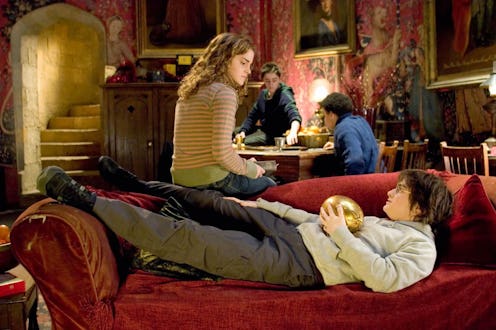
Just in case you didn't cry hard enough reading the books or in the #BonusRound of feels during the movies, here's another Harry Potter fan theory to wreck your day. This one regards why Harry's class at Hogwarts was so small. There are five boys (Harry, Ron, Neville, Seamus, and Dean) in Gryffindor in Harry's year. If this is a rough representation of how many students there are in each year in each house, then we add the girls in and get 10 students per house per year. Add all the houses and you get 40 students in each year. Add in all the years and get 280 students in Hogwarts at any given time. That seems like a reasonable number on its own, right?
Enter J.K. Rowling, who was once quoted saying that there was a Wizarding population of about 3,000 in the UK, and a student body of about 1,000 at Hogwarts. This doesn't quite fit with the numbers that we're presented in the books, though. Even if Harry's group was the exception to the rule, and there just happened to be fewer Gryffindors in his year, he observes in a full Quidditch stadium at one point that three-quarters of the students were supporting Gryffindor, and 200 were supporting Slytherin (implying it was about an 800-person student body). Furthermore, even if there were 1,000 students, that would be very incongruous with an overall wizard population of 3,000 in the UK, particularly given the long lifespans of wizards.
While we could just chock this up to J.K. Rowling having a few continuity errors in her interviews over the past few decades (which is legit — I mean, I don't know how there's room for anything else in her brain), Tumblr user marauders4evr had a much, much darker explanation for the discrepancies:
What if there were less students in the Hogwarts Class of 1998 because the period when the other kids would have been conceived (1979-1981) was when Voldemort’s reign of power was at its peak? Between the dozens of adults who joined the Order, the dozens of civilians who were killed in Death Eater raids, and the dozens of adults that didn’t want to bring a child into the world, just then … It’s actually entirely possible that there was a baby drought for a few years in the wizarding world, leading to a smaller class size a decade later.
Mic drop. And then mic fizzes out because it landed in A POOL OF TEARS.
It would also explain why there seem to be more muggle-borns in Harry's year than in other years — enough to assemble such a large group for Dumbledore's Army, despite the relatively small population at Hogwarts. Muggles obviously wouldn't have been afraid to reproduce during a war they knew nothing about, so while their numbers stayed the same, wizarding families would have dwindled. This might be one of the unconscious factors that created such a tipping point for Voldemort's return and the rallying of the Death Eaters that preceded it. For the first time, they didn't vastly outnumber the muggle-borns in their midst, and they felt threatened by it.
So basically, as much as everyone hates on the Weasley family for multiplying like ginger bunnies, they were doing the one thing a lot of people were too scared to do at the time — continuing on with their regular lives instead of letting the fear of Voldemort and his followers entirely consume them. Props to them, and a moment of silence for the Potters and the Longbottoms and all the other people who sent their figurative "Eff you" to the Death Eaters by living their lives regardless, as true Gryffindors would.
Images: Warner Bros; Giphy